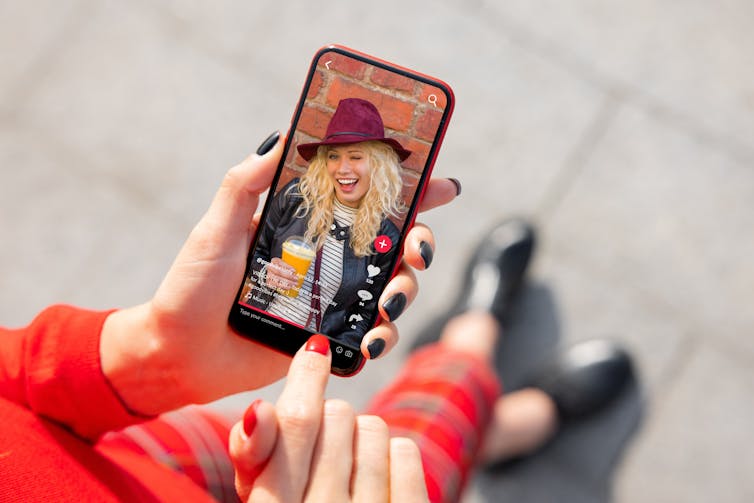Tattle Life, an anonymous gossip forum, has been described as “the most toxic place on the internet”. “Fake boobs, fake teeth, fake nose, fake life”, “Career is down the drain; she’s still so vain!” and “Always the wedding guest but never the bride” are just a selection of the thread titles on the site.
People are increasingly turning to gossip forums like Tattle Life, Guru Gossip, GOMI (“Get Off My Internets”) and the Blogsnark subreddit to critique the influencers they follow. On these forums, users pick apart everything from the influencer’s social media content to their appearance. Even their relationships with their friends, partners and children come under scrutiny. Yet a surprising phrase is repeated across the forums – “I used to love her”.
Many forum users are former fans of the influencers they now publicly and enthusiastically criticise. So why might you start to hate the influencers you once loved?
This article is part of Quarter Life, a series about issues affecting those of us in our twenties and thirties. From the challenges of beginning a career and taking care of our mental health, to the excitement of starting a family, adopting a pet or just making friends as an adult. The articles in this series explore the questions and bring answers as we navigate this turbulent period of life.
You may be interested in:
We are living in a ‘digital dark age’ – here’s how to protect your photos, videos and other data
Instapoetry is successful and there’s nothing wrong with that
TikTok’s pomegranate obsession: the trendy fruit was also big during the Renaissance to talk about female fertility
Influencers excel at establishing parasocial relationships with their followers. These are relationships that are largely one-way, but experienced by followers as reciprocal. Favourite influencers can often feel like friends, even though they are likely unaware of their followers’ existence. However, our study of two prominent gossip forums found that these parasocial relationships can turn sour, with love and adoration replaced by feelings of hostility and even hatred.
Feeling excluded
Influencers typically rise to fame by sharing intimate details about their lives, but later impose boundaries to protect their privacy and mental health. This can shatter the illusion of intimacy, prompting anger from followers who feel entitled to omitted information. One forum user observed:
You can’t share a relationship with your followers for the best part of ten years then not properly address the break-up … She set the boundaries and level of privacy in her life. She can’t just suddenly shift them and not expect a reaction.
When we feel excluded by an influencer, our feelings can become increasingly hostile. Yet rather than simply unfollowing, many turn to gossip forums to fill the “narrative gaps” with their own theories, backed up with “evidence” gathered through extensive online research.
From inspecting every detail of their posts, to accessing company accounts, posters were committed to uncovering the hidden details of influencers’ lives. They celebrated theories that were proven right, like when a long-suspected pregnancy or breakup was announced, and congratulated themselves on their “detective work”.
Our findings indicate that gossip forums enable users to overcome feelings of exclusion by recreating the illusion that they know the influencer intimately.

Kaspars Grinvalds/Shutterstock
Feeling ignored
Influencers create the illusion that followers’ relationships with them are reciprocated by “liking” and replying to their comments. However, as their audience grows, they typically become less responsive. Many influencers also delete comments and block comments containing certain keywords. This leads some followers to feel ignored. As one poster in our study observed:
I constantly see her asking questions on Twitter or Instagram and her followers give her really nice feedback or comments and even recommendations and advice. She never replies, says thank you or even just acknowledges them with the little heart/thumbs up button.
Forum members perpetuated the belief that the influencers read the forums. They frequently interpreted influencers’ social media content as attempts to address critiques posted by forum members, with posts like: “Could she make it any more obvious that she’s addressing everything that’s discussed on here!” and “This was her addressing us again.”
Posters often addressed influencers directly, advising them on how to improve their content and repair their relationship with their followers. One commenter prefaced a long list of suggestions with the following statement:
If you do read these comments, I wanted to offer a constructive overview of why so many of us used to watch your content, but no longer do. I’m not a catty person, so I have tried to explain as simply and constructively as I can, on a forum where my comment won’t be deleted.
Our data indicates that posting on gossip forums can help followers feel seen and acknowledged by influencers in a way that they don’t outside of the forums.

New Africa/Shutterstock
Feeling exploited
As an influencer’s fame grows, they profit from their following via increasingly lucrative brand endorsements and partnerships. Followers can feel exploited when influencers only post content with a direct commercial gain. One poster observed: “I cannot believe she has the audacity to post such half-assed, unauthentic sponsored content after five weeks away.”
The forums enable users to maintain intimate knowledge of the influencer’s content through other members’ posts, without supporting them commercially by directly engaging with their social media content.
Followers also expressed frustration when influencers did not clearly disclose paid ads and used the forum to facilitate mass reporting of non-compliant posts to the UK’s Advertising Standards Authority. Retaliating in this way enabled forum members to alleviate feelings of being exploited.
Gossip forum users are often dismissed as trolls and bullies, but this doesn’t paint a complete picture. Our research provides insight into the appeal of these forums.
The intensity of followers’ parasocial relationships with influencers means that even when the relationship becomes characterised by hostility, they cannot simply walk away but instead seek alternative ways to sustain the relationship and reestablish lost intimacy.
If your own feelings towards your favourite influencer are starting to sour, try to simply allow the parasocial relationship to fizzle out over time. Just as stalking an ex on social media often does more harm than good, gossip forums are an alluring, but often unhealthy, temptation.

Looking for something good? Cut through the noise with a carefully curated selection of the latest releases, live events and exhibitions, straight to your inbox every fortnight, on Fridays. Sign up here.




